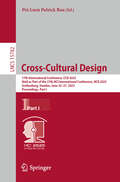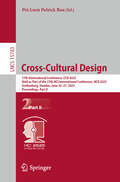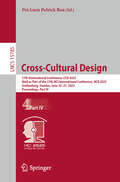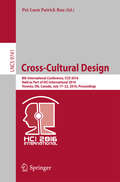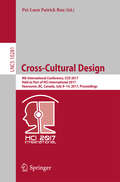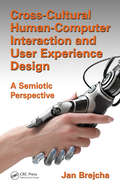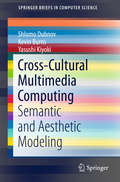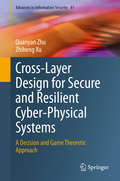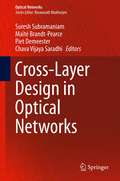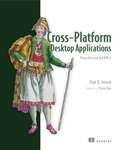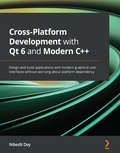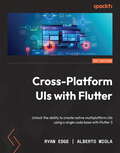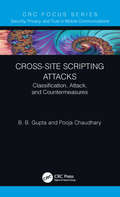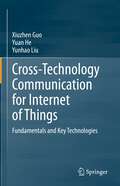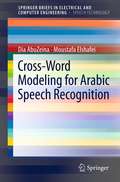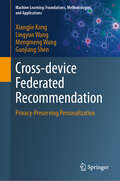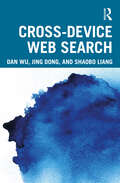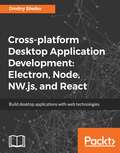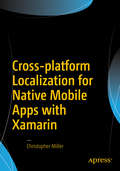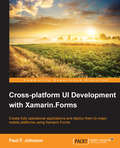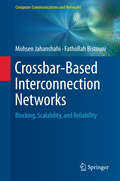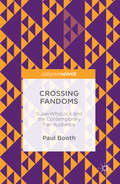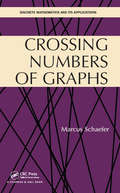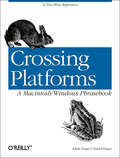- Table View
- List View
Cross-Cultural Design: 17th International Conference, CCD 2025, Held as Part of the 27th HCI International Conference, HCII 2025, Gothenburg, Sweden, June 22–27, 2025, Proceedings, Part I (Lecture Notes in Computer Science #15782)
by Pei-Luen Patrick RauThis four-volume set LNCS 15782-15785 constitutes the refereed proceedings of the 17th International Conference on Cross-Cultural Design, CCD 2025, held as part of the 27th International Conference on Human-Computer Interaction, HCII 2025, in Gothenburg, Sweden, during June 22-27, 2025.The total of 1430 papers and 355 posters included in the HCII 2025 proceedings was carefully reviewed and selected from 7972 submissions.The four volumes cover the following topics:Part I: Cross-cultural user experience and design; cross-cultural emotional and psychological factors in interaction; and cross-cultural usability and interaction design.Part II: Artificial intelligence in cultural heritage and creativity; cross-cultural generative AI; and AI applications and sustainable innovation.Part III: Cross-cultural arts and aesthetics; cross-cultural social innovation; automotive and transportation user experience; and cross-cultural design and cultural heritage.Part IV: Digital learning, STEM education and AI-driven pedagogy; smart systems, intelligent interaction and user perception; and cross-cultural health and wellbeing.
Cross-Cultural Design: 17th International Conference, CCD 2025, Held as Part of the 27th HCI International Conference, HCII 2025, Gothenburg, Sweden, June 22–27, 2025, Proceedings, Part II (Lecture Notes in Computer Science #15783)
by Pei-Luen Patrick RauThis four-volume set LNCS 15782-15785 constitutes the refereed proceedings of the 17th International Conference on Cross-Cultural Design, CCD 2025, held as part of the 27th International Conference on Human-Computer Interaction, HCII 2025, in Gothenburg, Sweden, during June 22-27, 2025.The total of 1430 papers and 355 posters included in the HCII 2025 proceedings was carefully reviewed and selected from 7972 submissions.The four volumes cover the following topics:Part I: Cross-cultural user experience and design; cross-cultural emotional and psychological factors in interaction; and cross-cultural usability and interaction design.Part II: Artificial intelligence in cultural heritage and creativity; cross-cultural generative AI; and AI applications and sustainable innovation.Part III: Cross-cultural arts and aesthetics; cross-cultural social innovation; automotive and transportation user experience; and cross-cultural design and cultural heritage.Part IV: Digital learning, STEM education and AI-driven pedagogy; smart systems, intelligent interaction and user perception; and cross-cultural health and wellbeing.
Cross-Cultural Design: 17th International Conference, CCD 2025, Held as Part of the 27th HCI International Conference, HCII 2025, Gothenburg, Sweden, June 22–27, 2025, Proceedings, Part IV (Lecture Notes in Computer Science #15785)
by Pei-Luen Patrick RauThis four-volume set LNCS 15782-15785 constitutes the refereed proceedings of the 17th International Conference on Cross-Cultural Design, CCD 2025, held as part of the 27th International Conference on Human-Computer Interaction, HCII 2025, in Gothenburg, Sweden, during June 22-27, 2025.The total of 1430 papers and 355 posters included in the HCII 2025 proceedings was carefully reviewed and selected from 7972 submissions.The four volumes cover the following topics:Part I: Cross-cultural user experience and design; cross-cultural emotional and psychological factors in interaction; and cross-cultural usability and interaction design.Part II: Artificial intelligence in cultural heritage and creativity; cross-cultural generative AI; and AI applications and sustainable innovation.Part III: Cross-cultural arts and aesthetics; cross-cultural social innovation; automotive and transportation user experience; and cross-cultural design and cultural heritage.Part IV: Digital learning, STEM education and AI-driven pedagogy; smart systems, intelligent interaction and user perception; and cross-cultural health and wellbeing.
Cross-Cultural Design: 8th International Conference, CCD 2016, Held as Part of HCI International 2016, Toronto, ON, Canada, July 17-22, 2016, Proceedings (Lecture Notes in Computer Science #9741)
by Pei-Luen Patrick RauWith the increase of globalization of business and industry, IT products and services are often produced and marketed across geographical cultural boundaries without adequate consideration of culture. There is a high probability that IT products and services developed in one country may not be effectively used in another country, which may hinder their market penetration, sales, and use. Based on research and practice, Cross-Cultural Design for IT Products and Servicesprovides a resource for human factors engineers, designers, and marketing professionals who define and develop IT products and services for the global market. With its extensive review of cross-cultural theory and cross-cultural design literature, it is also a resource for those who are interested in research on cross-cultural design. The book presents an overview of the dimensions of culture that have implications for human information processing and affective response. It examines a set of user interface design guidelines grouped into five areas: language, use of color, icons and images, navigation, and information architecture. Also, it addresses physical ergonomics and anthropometry issues. The text translates theory and guidelines into a practical methodology and discusses how to integrate methods of cross-cultural design into a standard engineering process for product development. The authors review and reappraise theories, models, principles, and techniques for design of IT products and services that will be marketed globally. They provide guidelines for user interface design across North American, Asian, and other cultures. Applying the guidelines within the methodological framework provided will enhance the usability and effectiveness of the IT product or service, and contribute to greater user satisfaction, increased productivity, higher sales, and lower product support costs.
Cross-Cultural Design: 9th International Conference, CCD 2017, Held as Part of HCI International 2017, Vancouver, BC, Canada, July 9-14, 2017, Proceedings (Lecture Notes in Computer Science #10281)
by Pei-Luen Patrick RauWith the increase of globalization of business and industry, IT products and services are often produced and marketed across geographical cultural boundaries without adequate consideration of culture. There is a high probability that IT products and services developed in one country may not be effectively used in another country, which may hinder their market penetration, sales, and use. Based on research and practice, Cross-Cultural Design for IT Products and Services provides a resource for human factors engineers, designers, and marketing professionals who define and develop IT products and services for the global market. With its extensive review of cross-cultural theory and cross-cultural design literature, it is also a resource for those who are interested in research on cross-cultural design. The book presents an overview of the dimensions of culture that have implications for human information processing and affective response. It examines a set of user interface design guidelines grouped into five areas: language, use of color, icons and images, navigation, and information architecture. Also, it addresses physical ergonomics and anthropometry issues. The text translates theory and guidelines into a practical methodology and discusses how to integrate methods of cross-cultural design into a standard engineering process for product development. The authors review and reappraise theories, models, principles, and techniques for design of IT products and services that will be marketed globally. They provide guidelines for user interface design across North American, Asian, and other cultures. Applying the guidelines within the methodological framework provided will enhance the usability and effectiveness of the IT product or service, and contribute to greater user satisfaction, increased productivity, higher sales, and lower product support costs.
Cross-Cultural Human-Computer Interaction and User Experience Design: A Semiotic Perspective
by Jan BrejchaThis book describes patterns of language and culture in human-computer interaction (HCI). Through numerous examples, it shows why these patterns matter and how to exploit them to design a better user experience (UX) with computer systems. It provides scientific information on the theoretical and practical areas of the interaction and communication design for research experts and industry practitioners and covers the latest research in semiotics and cultural studies, bringing a set of tools and methods to benefit the process of designing with the cultural background in mind.
Cross-Cultural Multimedia Computing: Semantic and Aesthetic Modeling (SpringerBriefs in Computer Science)
by Shlomo Dubnov Kevin Burns Yasushi KiyokiThe ability to communicate cultural codes in multimedia depends on their meaning and beauty, as perceived by different audiences around the globe. In this book, the ongoing research on computational modeling of visual, musical and textual contents is described in terms of identifying and mapping their semantic representations across different cultures. The underlying psychology of sense-making is quantified through analysis of aesthetics in terms of organizational and structural aspects of the contents that influence an audience's formation of expectations for future signals, violations of these expectations, and explanations of their meaning. Complexity-accuracy tradeoffs in sound representation are further used to develop new computational methods that capture poietic and aesthetic aspects in music communication. Experimental studies are reported that try to characterize preferences for complexity in abstract, classical and traditional art and music across samples of Western and Far Eastern cultures. These experiments illustrate how aesthetics can be computed in terms of semantic and information measures, highlighting commonalities and uncovering differences in aesthetic preferences across cultures and individuals.
Cross-Layer Design for Secure and Resilient Cyber-Physical Systems: A Decision and Game Theoretic Approach (Advances in Information Security #81)
by Quanyan Zhu Zhiheng XuThis book introduces a cross-layer design to achieve security and resilience for CPSs (Cyber-Physical Systems). The authors interconnect various technical tools and methods to capture the different properties between cyber and physical layers. Part II of this book bridges the gap between cryptography and control-theoretic tools. It develops a bespoke crypto-control framework to address security and resiliency in control and estimation problems where the outsourcing of computations is possible. Part III of this book bridges the gap between game theory and control theory and develops interdependent impact-aware security defense strategies and cyber-aware resilient control strategies.With the rapid development of smart cities, there is a growing need to integrate the physical systems, ranging from large-scale infrastructures to small embedded systems, with networked communications. The integration of the physical and cyber systems forms Cyber-Physical Systems (CPSs), enabling the use of digital information and control technologies to improve the monitoring, operation, and planning of the systems. Despite these advantages, they are vulnerable to cyber-physical attacks, which aim to damage the physical layer through the cyber network.This book also uses case studies from autonomous systems, communication-based train control systems, cyber manufacturing, and robotic systems to illustrate the proposed methodologies. These case studies aim to motivate readers to adopt a cross-layer system perspective toward security and resilience issues of large and complex systems and develop domain-specific solutions to address CPS challenges.A comprehensive suite of solutions to a broad range of technical challenges in secure and resilient control systems are described in this book (many of the findings in this book are useful to anyone working in cybersecurity). Researchers, professors, and advanced-level students working in computer science and engineering will find this book useful as a reference or secondary text. Industry professionals and military workers interested in cybersecurity will also want to purchase this book.
Cross-Layer Design in Optical Networks (Optical Networks #15)
by Chava Vijaya Saradhi Maïté Brandt-Pearce Suresh Subramaniam Piet DemeesterThis work addresses the topic of optical networks cross-layer design with a focus on physical-layer-impairment-aware design. Contributors captures both the physical-layer-aware network design as well as the latest advances in service-layer-aware network design. Treatment of topics such as, optical transmissions which are prone to signal impairments, dense packing of wavelengths, dispersion, crosstalk, etc., as well as how to design the network to mitigate such impairments, are all covered.
Cross-Platform Desktop Applications: Using Node, Electron, and NW.js
by Paul JensenSummaryCross-Platform Desktop Applications guides you step-by-step through creating Node.js desktop applications with NW.js and Electron from GitHub. Foreword by Cheng Zhao, creator of Electron.Purchase of the print book includes a free eBook in PDF, Kindle, and ePub formats from Manning Publications.About the TechnologyDesktop application development has traditionally required high-level programming languages and specialized frameworks. With Electron and NW.js, you can apply your existing web dev skills to create desktop applications using only HTML, CSS, and JavaScript. And those applications will work across Windows, Mac, and Linux, radically reducing development and training time.About the BookCross-Platform Desktop Applications guides you step by step through the development of desktop applications using Electron and NW.js. This example-filled guide shows you how to create your own file explorer, and then steps through some of the APIs provided by the frameworks to work with the camera, access the clipboard, make a game with keyboard controls, and build a Twitter desktop notification tool. You'll then learn how to test your applications, and debug and package them as binaries for various OSs.What's InsideCreate a selfie app with the desktop cameraLearn how to test Electron apps with DevtronLearn how to use Node.js with your applicationAbout the ReaderWritten for developers familiar with HTML, CSS, and JavaScript.About the AuthorPaul Jensen works at Starcount and lives in London, UK.Table of ContentsPART 1 - WELCOME TO NODE.JS DESKTOP APPLICATION DEVELOPMENTIntroducing Electron and NW.jsLaying the foundation for your first desktop applicationBuilding your first desktop applicationShipping your first desktop applicationPART 2 - DIVING DEEPERUsing Node.js within NW.js and ElectronExploring NW.js and Electron's internalsPART 3 - MASTERING NODE.JS DESKTOP APPLICATION DEVELOPMENTControlling how your desktop app is displayedCreating tray applicationsCreating application and context menusDragging and dropping files and crafting the UIUsing a webcam in your applicationStoring app dataCopying and pasting contents from the clipboardBinding on keyboard shortcutsMaking desktop notificationsPART 4 - GETTING READY TO RELEASETesting desktop appsImproving app performance with debuggingPackaging the application for the wider world
Cross-Platform Development with Qt 6 and Modern C++: Design and build applications with modern graphical user interfaces without worrying about platform dependency
by Nibedit DeyEnhance your cross-platform programming abilities with the powerful features and capabilities of Qt 6Key FeaturesLeverage Qt and C++ capabilities to create modern, cross-platform applications that can run on a wide variety of software applicationsExplore what's new in Qt 6 and understand core concepts in depthBuild professional customized GUI applications with the help of Qt CreatorBook DescriptionQt is a cross-platform application development framework widely used for developing applications that can run on a wide range of hardware platforms with little to no change in the underlying codebase. If you have basic knowledge of C++ and want to build desktop or mobile applications with a modern graphical user interface (GUI), Qt is the right choice for you. Cross-Platform Development with Qt 6 and Modern C++ helps you understand why Qt is one of the favorite GUI frameworks adopted by industries worldwide, covering the essentials of programming GUI apps across a multitude of platforms using the standard C++17 and Qt 6 features.Starting with the fundamentals of the Qt framework, including the features offered by Qt Creator, this practical guide will show you how to create classic user interfaces using Qt Widgets and touch-friendly user interfaces using Qt Quick. As you advance, you'll explore the Qt Creator IDE for developing applications for multiple desktops as well as for embedded and mobile platforms. You will also learn advanced concepts about signals and slots. Finally, the book takes you through debugging and testing your app with Qt Creator IDE.By the end of this book, you'll be able to build cross-platform applications with a modern GUI along with the speed and power of native apps.What you will learnWrite cross-platform code using the Qt framework to create interactive applicationsBuild a desktop application using Qt WidgetsCreate a touch-friendly user interface with Qt QuickDevelop a mobile application using Qt and deploy it on different platformsGet to grips with Model/View programming with Qt Widgets and Qt QuickDiscover Qt's graphics framework and add animations to your user interfaceWrite test cases using the Qt Test framework and debug codeBuild a translation-aware applicationFollow best practices in Qt to write high-performance codeWho this book is forThis book is for application developers who want to use C++ and Qt to create modern, responsive applications that can be deployed to multiple operating systems such as Microsoft Windows, Apple macOS, and Linux desktop platforms. Although no prior knowledge of Qt is expected, beginner-level knowledge of the C++ programming language and object-oriented programming system (OOPs) concepts will be helpful.
Cross-Platform UIs with Flutter: Unlock the ability to create native multiplatform UIs using a single code base with Flutter 3
by Ryan Edge Alberto MiolaBuild a variety of dynamic projects and beautiful UIs as you explore the power of Flutter for the web, desktop, and mobileKey FeaturesDiscover state management solutions with InheritedWidget and the Provider packageCreate responsive and beautiful UIs with the Material and Cupertino librariesExplore animations, forms, gestures, and backend integration with SupabaseBook DescriptionFlutter is a UI toolkit for building beautiful, natively compiled applications for mobile, web, desktop, and embedded devices from a single code base. With Flutter, you can write your code once and run it anywhere using a single code base to target multiple platforms. This book is a comprehensive, project-based guide for new and emerging Flutter developers that will help empower you to build bulletproof applications.Once you start reading book, you'll quickly realize what sets Flutter apart from its competition and establish some of the fundamentals of the toolkit. As you work on various project applications, you'll understand just how easy Flutter is to use for building stunning UIs. This book covers navigation strategies, state management, advanced animation handling, and the two main UI design styles: Material and Cupertino. It'll help you extend your knowledge with good code practices, UI testing strategies, and CI setup to constantly keep your repository's quality at the highest level possible.By the end of this book, you'll feel confident in your ability to transfer the lessons from the example projects and build your own Flutter applications for any platform you wish.What you will learnCreate responsive and attractive UIs for any deviceGet to grips with caching and widget trees and learn some framework performance tipsManage state using Flutter's InheritedWidget systemOrchestrate the app flow with Navigator 1.0 and 2.0Explore the Material and Cupertino built-in themesBreathe life into your apps with animationsImprove code quality with golden tests, CI setup, and linter rulesWho this book is forThis book is for software developers with a good grasp of Flutter, who want to learn best practices and techniques for building clean, intuitive UIs using a single codebase for mobile and the web. Prior experience with Flutter, Dart, and object-oriented programming (OOP) will help you understand the concepts covered in the book.
Cross-Site Scripting Attacks: Classification, Attack, and Countermeasures (Security, Privacy, and Trust in Mobile Communications)
by B. B. Gupta Pooja ChaudharySocial network usage has increased exponentially in recent years. Platforms like Facebook, Twitter, Google+, LinkedIn and Instagram, not only facilitate sharing of personal data but also connect people professionally. However, development of these platforms with more enhanced features like HTML5, CSS, XHTML and Java Script expose these sites to various vulnerabilities that may be the root cause of various threats. Therefore, social networking sites have become an attack surface for various cyber-attacks such as XSS attack and SQL Injection. Numerous defensive techniques have been proposed, yet with technology up-gradation current scenarios demand for more efficient and robust solutions. Cross-Site Scripting Attacks: Classification, Attack, and Countermeasures is a comprehensive source which provides an overview of web-based vulnerabilities and explores XSS attack in detail. This book provides a detailed overview of the XSS attack; its classification, recent incidences on various web applications, and impacts of the XSS attack on the target victim. This book addresses the main contributions of various researchers in XSS domain. It provides in-depth analysis of these methods along with their comparative study. The main focus is a novel framework which is based on Clustering and Context based sanitization approach to protect against XSS attack on social network. The implementation details conclude that it is an effective technique to thwart XSS attack. The open challenges and future research direction discussed in this book will help further to the academic researchers and industry specific persons in the domain of security.
Cross-Technology Coexistence Design for Wireless Networks (SpringerBriefs in Computer Science)
by Kaishun Wu Junmei YaoThis book introduces readers to the fundamentals of the cross-technology coexistence problem in heterogeneous wireless networks. It also highlights a range of mechanisms designed to combat this problem and improve network performance, including protocol design, theoretical analysis, and experimental evaluation.In turn, the book proposes three mechanisms that can be combined to combat the cross-technology coexistence problem and improve network performance. First, the authors present a fast signal identification method. It provides the basis for the subsequent protocol design and allows heterogeneous devices to adopt proper transmission strategies. Second, the authors present two cross-technology interference management mechanisms in both the time domain and the frequency domain, which can mitigate interference and increase transmission opportunities for heterogeneous devices, thus improving network performance. Third, they present a cross-technology communication mechanism based on symbol-level energy modulation, which allows heterogeneous devices to transmit information directly without a gateway, improving transmission efficiency and paving the way for new applications in IoT scenarios. Lastly, they outline several potential research directions to further improve the efficiency of cross-technology coexistence. This book is intended for researchers, computer scientists, and engineers who are interested in the research areas of wireless networking, wireless communication, mobile computing, and Internet of Things. Advanced-level students studying these topics will benefit from the book as well.
Cross-Technology Communication for Internet of Things: Fundamentals and Key Technologies
by Yunhao Liu Xiuzhen Guo Yuan HeCross-technology communication (CTC) is a technology that enables direct communication between heterogeneous devices that use different wireless standards. It works like a “translator” between two or more wireless technologies. CTC not only creates a new avenue for inter-operation and data exchange between wireless devices but also enhances the ability to manage wireless networks. This book focuses on the enabling technology CTC and introduces readers to a variety of CTC techniques in heterogeneous wireless networks. These techniques can be divided into two categories: packet-level CTCs based on energy modulation and channel intervention; and physical-level CTCs based on cross-demapping, digital emulation, and split encoding. The book offers a comprehensive comparison and analysis, granting readers a deeper understanding of CTC techniques in terms of throughput, reliability, hardware modification, and concurrency. Moreover, it highlights upper-layer CTC application scenarios and cutting-edge developments, which include but are not limited to interference management, channel quality estimation, network routing, etc. The book is intended for all readers – e.g., researchers, students, and even professionals – who are interested in the areas of wireless networking, wireless communication, mobile computing, and Internet of Things. The findings and summaries presented here can help: 1) guide researchers to rethink CTC techniques in connection with design methodology; 2) further advance the infrastructure of future IoT by introducing CTC; and 3) enable important IoT applications by delivering ubiquitous network connectivity.
Cross-Word Modeling for Arabic Speech Recognition (SpringerBriefs in Speech Technology)
by Dia Abuzeina Moustafa ElshafeiCross-Word Modeling for Arabic Speech Recognition utilizes phonological rules in order to model the cross-word problem, a merging of adjacent words in speech caused by continuous speech, to enhance the performance of continuous speech recognition systems. The author aims to provide an understanding of the cross-word problem and how it can be avoided, specifically focusing on Arabic phonology using an HHM-based classifier.
Cross-device Federated Recommendation: Privacy-Preserving Personalization (Machine Learning: Foundations, Methodologies, and Applications)
by Xiangjie Kong Lingyun Wang Mengmeng Wang Guojiang ShenThis book introduces the prevailing domains of recommender systems and cross-device federated learning, highlighting the latest research progress and prospects regarding cross-device federated recommendation. As a privacy-oriented distributed computing paradigm, cross-device federated learning enables collaborative intelligence across multiple devices while ensuring the security of local data. In this context, ubiquitous recommendation services emerge as a crucial application of device-side AI, making a deep exploration of federated recommendation systems highly significant. This book is self-contained, and each chapter can be comprehended independently. Overall, the book organizes existing efforts in federated recommendation from three different perspectives. The perspective of learning paradigms includes statistical machine learning, deep learning, reinforcement learning, and meta learning, where each has detailed techniques (e.g., different neural building blocks) to present relevant studies. The perspective of privacy computing covers homomorphic encryption, differential privacy, secure multi-party computing, and malicious attacks. More specific encryption and obfuscation techniques, such as randomized response and secret sharing, are involved. The perspective of federated issues discusses communication optimization and fairness perception, which are widely concerned in the cross-device distributed environment. In the end, potential issues and promising directions for future research are identified point by point. This book is especially suitable for researchers working on the application of recommendation algorithms to the privacy-preserving federated scenario. The target audience includes graduate students, academic researchers, and industrial practitioners who specialize in recommender systems, distributed machine learning, information retrieval, information security, or artificial intelligence.
Cross-device Web Search
by Dan Wu Jing Dong Shaobo LiangCross-device Web Search is the first book to examine cross-device search behavior, which takes place when people utilize multiple devices and several sessions to research the same topic. Providing a comprehensive examination of cross-device search behaviors, the book also models and analyses their most important features and, by doing so, helps to elucidate the motivations behind such behaviors. Drawing on a variety of methods and sources, including system design, user experiments, and qualitative and quantitative analysis, the book introduces cross-device search, relates it to relevant conceptual models, and identifies cross-device search topics. Providing discussion of a comprehensive range of behaviors in the context of cross-device search, including querying, gazing, clicking, and touching, the book also presents the design and development of a system to support cross-device search, explores cross-device search behavior modeling, and predicts users’ search performance. Cross-device Web Search will be of great interest to academics and students situated in the fields of library and information science, computer science, and management science. The book should also provide fascinating insights to practitioners and others interested in information search retrieval, information seeking behavior, and human-computer interaction communities.
Cross-platform Desktop Application Development: Electron, Node, NW.js, and React
by Dmitry SheikoBuild powerful cross-platform desktop applications with web technologies such as Node, NW.JS, Electron, and React About This Book • Build different cross-platform HTML5 desktop applications right from planning, designing, and deployment to enhancement, testing, and delivery • Forget the pain of cross-platform compatibility and build efficient apps that can be easily deployed on different platforms. • Build simple to advanced HTML5 desktop apps, by integrating them with other popular frameworks and libraries such as Electron, Node.JS, Nw.js, React, Redux, and TypeScript Who This Book Is For This book has been written for developers interested in creating desktop applications with HTML5. The first part requires essential web-master skills (HTML, CSS, and JavaScript). The second demands minimal experience with React. And finally for the third it would be helpful to have a basic knowledge of React, Redux, and TypeScript. What You Will Learn • Plan, design, and develop different cross-platform desktop apps • Application architecture with React and local state • Application architecture with React and Redux store • Code design with TypeScript interfaces and specialized types • CSS and component libraries such as Photonkit, Material UI, and React MDL • HTML5 APIs such as desktop notifications, WebSockets, WebRTC, and others • Desktop environment integration APIs of NW.js and Electron • Package and distribute for NW.JS and Electron In Detail Building and maintaining cross-platform desktop applications with native languages isn't a trivial task. Since it's hard to simulate on a foreign platform, packaging and distribution can be quite platform-specific and testing cross-platform apps is pretty complicated.In such scenarios, web technologies such as HTML5 and JavaScript can be your lifesaver. HTML5 desktop applications can be distributed across different platforms (Window, MacOS, and Linux) without any modifications to the code. The book starts with a walk-through on building a simple file explorer from scratch powered by NW.JS. So you will practice the most exciting features of bleeding edge CSS and JavaScript. In addition you will learn to use the desktop environment integration API, source code protection, packaging, and auto-updating with NW.JS. As the second application you will build a chat-system example implemented with Electron and React. While developing the chat app, you will get Photonkit. Next, you will create a screen capturer with NW.JS, React, and Redux. Finally, you will examine an RSS-reader built with TypeScript, React, Redux, and Electron. Generic UI components will be reused from the React MDL library. By the end of the book, you will have built four desktop apps. You will have covered everything from planning, designing, and development to the enhancement, testing, and delivery of these apps. Style and approach Filled with real world examples, this book teaches you to build cross-platform desktop apps right from scratch using a step-by-step approach.
Cross-platform Localization for Native Mobile Apps with Xamarin
by Christopher MillerTailor your apps to appeal to a global market. Microsoft MVP Chris Miller steps you through the process of enabling multiple language support, while using a single shared set of language resources using the .NET Framework.You will learn to adapt a simple mobile application for the Android, iOS, and Windows platforms, and handle the localization and internationalization on each platform. You will test the application for localization support and to avoid common pitfalls. Using Xamarin Forms and Visual Studio, the app will be implemented for Android, iOS, and Windows 10 UWP, and 99% of the code will be shared across the platforms.What You Will Learn:What localization and internationalization are and why they matterSupport multiple languages on each platformHandle cultural differences such as dates and currenciesUse tools such as Microsoft’s Multilingual App Toolkit to manage language resourcesCreate a localized, cross-platform app with Android Studio, Xcode, Xamarin, and Visual Studio toolsGet help translating the text from the applicationWho This Book Is For:Mobile app developers currently writing native apps for Windows Phone, Android, and iOS
Cross-platform UI Development with Xamarin.Forms
by Paul F. JohnsonCreate a fully operating application and deploy it to major mobile platforms using Xamarin.Forms About This Book * Create standard user interfaces on Windows Mobile, Android, and iOS and then make those interfaces look good with ease * Design a full-blown application in very little time with just about the entire code being shared * Learn how to access platform-specific features and still have the same core code with this handy guide Who This Book Is For This book is intended for mobile software developers who are fed up with having three different code sets for the same application. If you want to put your code on all mobile platforms with minimum fuss, and just want to develop but haven't got the time to be digging too far into a particular platform, this is the book for you. Basic knowledge of C# is assumed. What You Will Learn * Create a responsive UI, modified to suit the target platform * Understand the basics of designing an application, and the considerations needed for target platforms * Construct a complete app using a single codebase * Develop attractive user interfaces * Bind information to the code behind to generate a reactive application * Design an effective portable class library (PCL) * Include a Windows Mobile application within your standard Xamarin.Forms application * Extend your applications using the Xamarin.Forms Labs library In Detail Xamarin is an IDE used for the development of native iOS, Android, and Windows, and cross-platform mobile applications in C#. For the mobile developer, that means learning three different languages to create the same application. Even if you use the Xamarin toolchain, you still need to work with three different user interface construction sets. Xamarin is essentially a container in which developers can write any application in C# and use the Xamarin compiler to package and deploy on Android, iOS, or Windows platforms. To top this, Xamarin.Forms plays the role of a single codebase for mobile applications. This book will show you, with fully-coded examples, how to use both the Xamarin toolchain and the Xamarin.Forms library to code once for the three platforms. It goes from the concept and design of a mobile messenger application to its execution. You will be introduced to Messenger--the messaging app--which includes key features such as push notifications, UI, maps, databases, and web services. Next, you will learn to plan the UI using Xamarin.Forms for cross-mobile platform development, and move on to creating custom buttons, extending the UI, and connecting to social sites such as Facebook and Twitter. You will also learn about the limitations of PCL libraries and how they make coding easier. This will be followed by the creation of a SQLite database and a database manager, and the SQLite database's reflection within the database manager. You will then be taken through the use of hardware features with ample coverage of iOS, Android, and Windows Mobile. Finally, the book will conclude by introducing common strategies that allow you to create applications that "just work" without having to reinvent the wheel each time. Style and approach A fun and informal approach to creating a mobile application using the most up-to-date cross-platform approach. Each coding chapter includes fully working code examples available for download from the Packt Publishing website.
Crossbar-Based Interconnection Networks: Blocking, Scalability, And Reliability (Computer Communications and Networks)
by Mohsen Jahanshahi Fathollah BistouniThis unique text/reference provides an overview of crossbar-based interconnection networks, offering novel perspectives on these important components of high-performance, parallel-processor systems. A particular focus is placed on solutions to the blocking and scalability problems.Topics and features: introduces the fundamental concepts in interconnection networks in multi-processor systems, including issues of blocking, scalability, and crossbar networks; presents a classification of interconnection networks, and provides information on recognizing each of the networks; examines the challenges of blocking and scalability, and analyzes the different solutions that have been proposed; reviews a variety of different approaches to improve fault tolerance in multistage interconnection networks; discusses the scalable crossbar network, which is a non-blocking interconnection network that uses small-sized crossbar switches as switching elements.This invaluable work will be of great benefit to students, researchers and practitioners interested in computer networks, parallel processing and reliability engineering. The text is also essential reading for course modules on interconnection network design and reliability.
Crossing Fandoms: SuperWhoLock and the Contemporary Fan Audience
by Paul BoothThis book examines the fan-created combination of Doctor Who, Sherlock, and Supernatural as a uniquely digital fan experience, and as a metaphor for ongoing scholarship into contemporary fandom. What do you get when you cross the cult shows Doctor Who, Supernatural, and Sherlock? In this book, Paul Booth explores the fan-created crossover universe known as SuperWhoLock--a universe where Sherlock Holmes and Dean Winchester work together to fight monsters like the Daleks and the Weeping Angels; a world where John Watson is friends with Amy Pond; a space where the unique brands of fandom interact. Booth argues that SuperWhoLock represents more than just those three shows--it is a way of doing fandom. Through interviews with fans and analysis of fan texts, Crossing Fandoms: SuperWhoLock and the Contemporary Fan Audience also demonstrates how fan studies in the digital age can evolve to take into account changing fan activities and texts.
Crossing Numbers of Graphs (Discrete Mathematics and Its Applications)
by Marcus SchaeferCrossing Numbers of Graphs is the first book devoted to the crossing number, an increasingly popular object of study with surprising connections. The field has matured into a large body of work, which includes identifiable core results and techniques. The book presents a wide variety of ideas and techniques in topological graph theory, discrete geometry, and computer science. The first part of the text deals with traditional crossing number, crossing number values, crossing lemma, related parameters, computational complexity, and algorithms. The second part includes the rich history of alternative crossing numbers, the rectilinear crossing number, the pair crossing number, and the independent odd crossing number.It also includes applications of the crossing number outside topological graph theory. Aimed at graduate students and professionals in both mathematics and computer science The first book of its kind devoted to the topic Authored by a noted authority in crossing numbers
Crossing Platforms A Macintosh/Windows Phrasebook: A Dictionary for Strangers in a Strange Land
by David Pogue Adam EngstLike travelers in a foreign land, Mac users working in Windows or Windows users working on a Mac often find themselves in unfamiliar territory with no guidebook. Crossing Platforms: A Macintosh/Windows Phrasebook, with information presented in a translation dictionary-like format, offers users a handy way of translating skills and knowledge from one platform to the other. Whether it's explaining the difference between Macintoshaliases and Windows shortcuts or explaining how a Windows user would go about setting up Internet access on a Mac, this book provides readers a simple means to look up familiar interface elements and system features and learn how that element or feature works on the other platform.Crossing Platforms: A Macintosh/Windows Phrasebook includes:A general introduction to the key differences between the Mac and WindowsA to Z sections for each platform: one section where Mac users look up familiar Macintosh terms to find the equivalent function in Windows along with an explanation of the differences; and another section where Windows users find familiar Windows terms with pointers to the Macintosh equivalent along with full descriptions of how the function works on the Mac and important differences between the two platformsThe complete translation dictionary-like reference book,Crossing Platforms: A Macintosh/Windows Phrasebook provides a simple solution for everyone who has been confused and frustrated by the arbitrary and sometimes capricious differences between the Macintosh and Windows operating systems. This book bridges the Mac-PC knowledge gap many users are faced with when work or preference demands the use of both a PC and Mac. Whether you already know the Macintosh or Windows, this book helps you navigate in the other operating system using your existing skills and knowledge.
